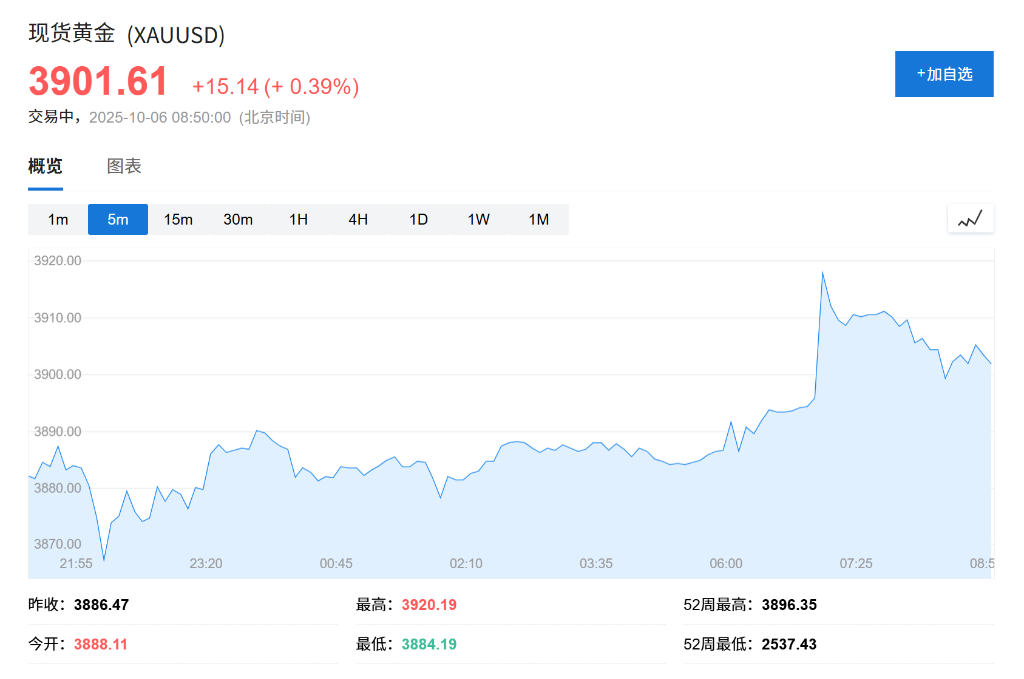Gold and Bitcoin both hit record highs as the U.S. government shutdown fuels "dollar depreciation trades"
As investors’ concerns over the U.S. fiscal outlook and the value of the dollar intensify, a “devaluation trade” aimed at hedging against dollar depreciation has become one of the most popular investment themes this year, driving both gold and bitcoin prices to record highs.
The partial shutdown of the U.S. federal government since last Wednesday has further fueled this trade. On Monday the 6th, spot gold broke through the $3,900/ounce mark, rising 0.35% intraday and setting a new all-time high. It took less than 10 days to break through the $3,800 mark for the first time. Meanwhile, bitcoin reached a high of $125,689 on the 5th (UTC+8), surpassing the previous record of $124,514 set on August 14.

Meanwhile, the ICE U.S. Dollar Index (DXY), which measures the dollar against six major currencies, fell 0.1% on Friday, with a cumulative decline of about 10% so far this year. Investors are accelerating their move away from the dollar and other fiat currencies, turning instead to alternative assets seen as stores of value.
This “devaluation trade” strategy has gained favor among retail investors ahead of the 2024 U.S. presidential election. Analysts believe that regardless of whether this government shutdown is brief or lasts for weeks, the structural factors behind it mean this trade still has room to grow in the future.
The Logic Behind the Dollar “Devaluation Trade”
The core of the “devaluation trade” is broad diversification, shifting investments from the dollar and other fiat currencies to other assets. The drivers of this trade stem from several long-term factors, including uncertainty over long-term inflation and the trajectory of U.S. fiscal policy, concerns about the independence of the Federal Reserve, and the prospect of persistently high deficits across major economies.
Matt Stucky, Chief Equity Portfolio Manager at Northwestern Mutual Wealth Management Co., said:
“‘Devaluation trade’ has shown strong momentum this year, with assets like gold and bitcoin delivering considerable returns. The decline in real interest rates, coupled with the Federal Reserve restarting rate cuts amid persistent inflation, has provided an extra catalyst for this rally.”
The U.S. government shutdown that began on Wednesday has become a key factor driving bitcoin’s price breakthrough. After lawmakers failed to reach a deal on federal funding, investors flocked to decentralized assets for safety.
Kendrick pointed out that bitcoin’s performance during this government shutdown is markedly different from the period between December 2018 and January 2019. He stated:
"During the last government shutdown under Trump, bitcoin was in a different position and thus performed flatly. However, this year, bitcoin has become correlated with U.S. government risk, best reflected in its relationship with the U.S. Treasury term premium."
Although historical data shows that the “devaluation trade” does not always accelerate during government shutdowns, analysts believe this event reflects deeper issues. In an email to MarketWatch, Matt Stucky said the current government shutdown is “yet another data point in the ongoing dysfunction of the political system.” He added:
“This dysfunction has led to federal deficits consistently far above normal levels for periods of economic expansion. High deficits and growing government debt are the result of decades of bipartisan cooperation, providing an extra boost to the ‘devaluation trade’.”
Jeff Muhlenkamp, senior fund manager at Pennsylvania-based Muhlenkamp & Co., also believes that the government shutdown is just a “minor episode” in the macro context, and that the real problems facing the U.S. are longer-term structural issues.
Bullish Analyst Outlook: Gold May Break $4,000
Bullish sentiment toward gold and bitcoin is heating up in the market. Citi analyst Alex Saunders said, bitcoin is now seen as a “digital gold,” which helps explain the correlation in their price movements. Based on continued investor demand, he set a 12-month price target of $181,000 for bitcoin.
However, Komal Sri-Kumar, president of a consulting firm and former chief global strategist at TCW Group, prefers to view this trade through the lens of gold. He believes that gold has existed for hundreds of years, while it remains to be seen whether bitcoin, as a new asset, can withstand market volatility. In his view, global tariff policies and the outlook for economic slowdown are eroding the value of various currencies, making gold highly attractive. He predicts:
“By the end of this year, gold prices will clearly break through $4,000.”
Fund manager Jeff Muhlenkamp also expressed long-term concerns about the dollar. He pointed out that the current U.S. deficit, equivalent to 6% to 6.5% of GDP, is already a red flag. As a result, his company has increased its gold holdings to 18% in recent years. Muhlenkamp believes that solving the debt problem requires the deficit-to-GDP ratio to fall by 1.5% to 2%, which is unlikely to happen in the next few years. He stated:
“I think we haven’t even started to reduce the actual debt burden yet—it’s still too early. We have a long way to go.”